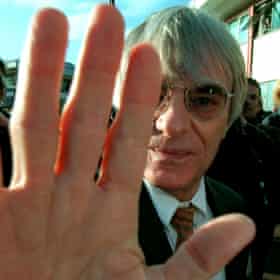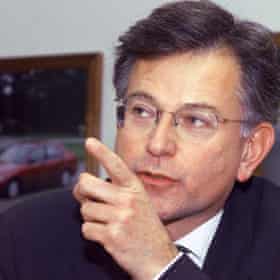Scandals involving current or former politicians apparently lobbying for outside commercial interests, as David Cameron did with Greensill Capital, are a recurring feature of UK politics. Here are some other notable examples.
Cash for questions
In one of the best known scandals, a series of Conservative MPs were accused of accepting cash to ask particular questions in parliament. One, Neil Hamilton, launched a libel action against the Guardian after it reported he had been paid £2,000 through a lobbyist to ask questions for Mohamed Al Fayed, then the millionaire owner of Harrods. But after a two-year legal fight, which included the law being changed so Hamilton could fight in court as an MP, he dropped the case hours before it was to start, in October 1996, prompting the Guardian headline: “A liar and a cheat.” The prime minister at the time, John Major, launched the Committee on Standards in Public Life, under Lord Nolan, in response to the controversy.
Bernie Ecclestone

After Tony Blair had replaced John Major in No 10 in 1997, hopes of moving on from the era of “sleaze” were soon dented when it emerged that Blair’s government had exempted Formula One from a new ban on tobacco advertising, several months after Bernie Ecclestone, the head of the sport’s governing body, donated £1m to Labour. The money was returned and Blair said the two events were not connected, insisting in a TV interview that he was “a pretty straight kind of guy”. Documents released under freedom of information laws in 2008 suggested Blair had intervened over the issue shortly after meeting Ecclestone.
Lobbygate
This was another New Labour controversy. It centred on Derek Draper, a former aide to Peter Mandelson who became a lobbyist. He lost his job in 1998 after boasting to an undercover reporter that there were “17 people who count” inside government, “and to say I am intimate with every one of them is the understatement of the century”. Much of this, Draper said later, was youthful braggadocio as opposed to genuine cronyism. He went on to train as a psychotherapist and is now known for having married the TV presenter Kate Garraway. Draper nearly died from coronavirus last year and his health remains severely affected.
Suspended peers
In 2009 two Labour peers, the former energy minister Peter Truscott and ex-council leader Thomas Taylor, became the first members of the Lords to be suspended in more than 350 years. The pair were recorded by undercover Sunday Times reporters saying they would help to amend a bill going through parliament in return for a fee. They denied wrongdoing, but were barred from the Lords for six months.
Labour ex-ministers

Three former Labour ministers, Stephen Byers, Geoff Hoon and Richard Caborn, were reprimanded in 2010 and lost their parliamentary passes for a period for breaching rules related to lobbying. The trio were filmed talking to a reporter from Channel 4’s Dispatches programme who claimed to represent a lobbying firm. Byers, the former transport secretary, described himself as being like a “cab for hire”, while Hoon, who had been defence secretary, told the reporter he wanted to use his connections for something that “bluntly, makes money”.
Cash for access
In 2012, the then co-treasurer of the Conservatives, Peter Cruddas, resigned after another undercover newspaper operation found he had told would-be party donors that a “premier league” sum of more than £200,000 would grant them direct access at social events to the then prime minister and the chancellor, David Cameron and George Osborne. Last year, Boris Johnson made Cruddas a peer, in defiance of advice from the Lords Appointments Commission. Before becoming PM, in 2010, Cameron had made a speech promising a crackdown on lobbying and “crony capitalism”.